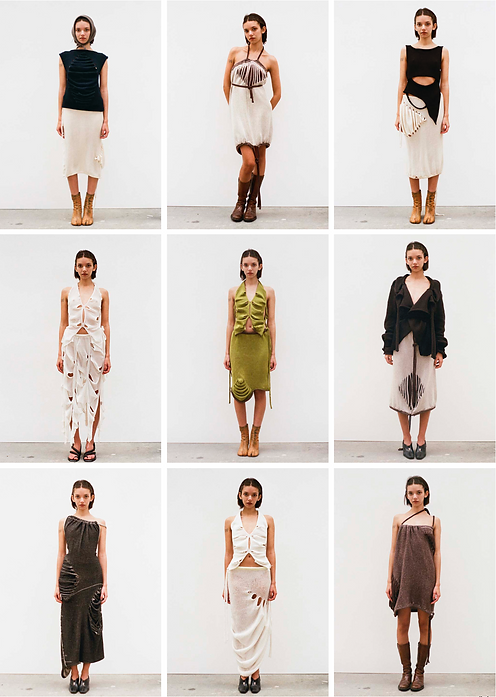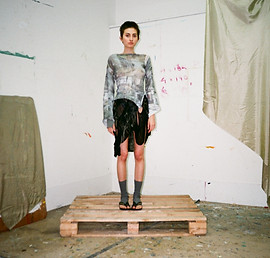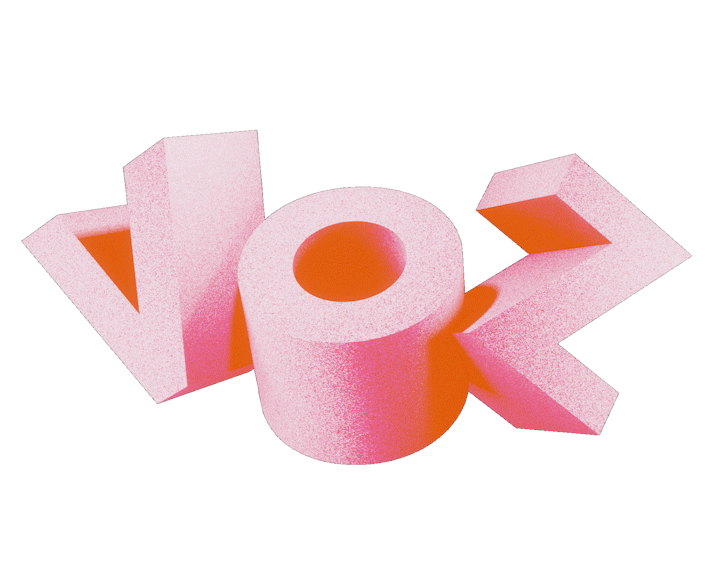
The knitwear designer talks to VOZ about not allowing herself to be limited by the stereotypes of a Latina designer and her latest collection ‘Dynamic Essentials’.

Krystal Paniagua's Dynamic Essentials collection photographed by Emma Louise.
Krystal Paniagua is the type of designer who amid a worldwide pandemic would decide to officially launch her eponymous label’s online shop. She is the type of designer who would make knitwear that is wearable during the summer. She is the type of designer who would base an entire collection on the decay of her beloved Puerto Rico and do that —and all of the above— successfully. “My label is about reality,” she says, “making it alluring, but keeping that sense of real life. [My garments don’t] limit what you do, [they] enhance it.”
The London based designer’s latest collection, ‘Dynamic Essentials’, officially launched on her newly inaugurated online store in December of 2020. It explores our capability to adapt as humans (to put it simply). A subject to which she relates, having moved throughout America and Europe since starting to work in fashion. “I will always have that Puerto Rican and Latino core, [but] my identity isn’t solely based on being Latina. I [am] willing to learn new things from people because that’s how you grow,” states Paniagua, “[The collection] is about the dynamic of life and how you can mould yourself. I come from a tropical place and now I’m living in a place that is cold and grey, but here I am, and I wear my jumper.” This concept translated into adaptable made-to-order garments with a muted colour palette of earthy browns and olive greens mixed with off-white and black. Dresses can morph into skirts, her ‘Butterfly Top’—a standout piece— is reversible and adjustable to different sizes and pieces such as the ‘Component Top’ can be worn in over 4 different ways. Paniagua cleverly aims to offer her clients garments with endless possibilities in wearability —of which they are unlikely to get bored of— resulting in life-long purchases.
“The pandemic changed my priorities. I [was] like, ‘Why am I making clothes that you're not going to see people wear? Why am I adding to so much waste? It changed my perspective in terms of what is meaningful. There are things that are so much more important than what I do, so how will I justify [it]? That helped me shape the collection in terms of [the adaptability of the garments],” comments Paniagua. The ‘Dynamic Essentials’ production was funded by Paniagua herself, using insurance money she received after her father’s death, “I managed to put 10k into the brand, which absolutely nothing when you're buying materials. But if it wasn't for him, I don't think I would [have been] able to put that much money [into the label] because it's all coming from my pocket.” Paniagua currently produces her collection at HQI, a non-profit organisation that provides working space for artists, where she was offered a residency.

Krystal Paniagua photographed by Amapolia.

In September of the same year, Paniagua was selected by Teen Vogue to be a part of their ‘Generation Next’ mentorship programme, which granted her access to mentoring and the funding to create a short film featured on the Teen Vogue website where she presented her SS21 Dynamic Essentials collection. She states this helped her gain visibility and most importantly credibility as young designers.
Paniagua started her formal fashion education in 2012 by attending FIT, from which she later transferred to Politecnico di Milano, where she specialised in knitwear, a craft she has continued to perfect ever since, and from which she has managed to produce unique and exciting outcomes. “It was a really good place to learn about knitwear and life. That was [also] when I started missing Puerto Rico [and] my projects started being based around my identity: Who am I and how am I evolving as a Latina person in a place that is completely alien to me?” After graduating in 2016, Paniagua worked at several temporary jobs. She interned for Anne Sofie Madsen in Denmark, worked for PR agencies in New York and for a stylist in California until she decided to do an MA in London’s Royal College of Arts. She specialised in womenswear and graduated in 2019. “[Puerto Rico] is a very limiting place for creators [in terms of] support. There is a limit to how much you can do on an island…” Paniagua replies when asked why she decided to develop her career outside of Puerto Rico. “You're far from the major cities, importation and exportation laws are very different… So, it makes it difficult for people, practitioners [and] even companies. [Also], there's something very powerful in learning from people that have a different mindset.”
The same year upon returning home to Puerto Rico, Paniagua unexpectantly stumbled upon a supportive group of people —including Puerto Rican PR company Amapolia— that helped her organize an impromptu fashion show to debut ‘Puñeta’, her graduate collection. “Puñeta is a bad word, but it's [also] an expression for anything,” says Paniagua, “so, [you use it] out of shock, excitement, or even anger. It's a very cultural thing, all Puerto Ricans [have Puñeta] in their vocabulary.” The designer started developing her collection inspired by imagery she had produced and collected over time of the streets and architecture of Puerto Rico. One of her stand-out prints (produced on a whim) featured a chicken standing on a dust road, “It received really good feedback, apparently that chicken was it for them [laughs]. [Looking back], I understand why; It’s an image I produced and it’s what I see daily in Puerto Rico. It's personal [and] very intuitive,” comments Paniagua. The designer showcased the Puerto Rico she grew up in authentically, not what is usually presented to outsiders, “If you're not in the centre, [Puerto Rico] is falling apart... holes in the street, walls painted with cheap paint... It's [due to] the inefficiency of the government, and [it’s] the aesthetic that we've grown to love. When I showed my family [the pictures I used] they were disappointed that I wanted to show that. But 80% of the island looks like this… lots of beautiful green spaces and infrastructure [that] is falling apart,” the designer states, “there's something very special, it has its own identity, it influences how Puerto Ricans interact and [it’s] part of our daily conversations.”




The Puñeta collection photographed by Krystal Paniagua.
For ‘Puñeta,’ Paniagua aimed to translate the essence of these images taken in Puerto Rico through garments. When portraying decay and irregularities the texture of knitted surfaces became a crucial element to experiment with and which Paniagua fully utilised to her advantage. The final collection was produced by combining three meticulously selected techniques: printing images directly onto the knits, what Paniagua calls ‘organic knits’ —which consist of creating contrast between tight and loose stitches on a knitted garment by having an elastic on one of the sides and exposing the body on the other— and making cut-outs with distressed edges. The latter were embroidered at the ends to prevent them from unravelling, “That was [something] I wanted to do: How do I show something that is falling apart but in reality, [maintains its] quality [and is] wearable.” The black and white imagery of Puerto Rican roads, houses, nature and, of course, chickens — printed onto knitted cut-out dresses, skirts, and tops — was contrasted with soft yellow, bright turquoise, and green fabrics resulting in an eye-catching colour palette. Her collection successfully captured the beauty she saw in the authentic Puerto Rico many attempt to hide.
The show took place at Publica Gallery, and unlike conventional fashion shows in Puerto Rico, there was no dress code, and everyone was welcome. To Paniagua’s surprise, the gallery was filled with “grannies, neighbours, fashion kids, kids that don't [know] about fashion… everybody… even an editor of Vogue France” who happened to be visiting the island. People eating at the gallery’s restaurant peaked from behind the wall trying to catch a glimpse of Paniagua’s creations, while the show attendees drank water and bread made by a local baker — a clever pun on the designer’s last name which translates to “bread-and-water”. “I was grateful [for] the people that happened to be there and the attention,” the designer says, “It manifested itself into a nice event that went beyond just showing my clothes. It was about embracing that community that I speak so much about and am inspired [by].” Paniagua enjoyed most of all being able to provide Puerto Ricans with the opportunity to work in a show like hers and that resulted in having their work published on international platforms such as i-D and Dazed.
Krystal Paniagua's Puñeta fashion show at Publica Gallery in Puerto Rico.
Although ‘Puñeta’ was about showcasing Puerto Rico authentically, while ‘Dynamic Essentials’ touched on a broader topic, Paniagua shares that with both collections she came across people trying to constrain her garments into what they think a Latina designer should be producing or portraying. “[People] would tell me to make my [models] ‘nastier’ because that's the ‘Latin aesthetic,’ that's the misconception of what a Latin person is, especially a woman: an oversexualized sassy person,” comments the designer. “[It] goes back to […] the stereotype [of], ‘I'm a Latino designer so I should be using pink [and] yellow fringes in my dresses…’ [But] no. The point is to make clothes that anybody can wear,” she says, “that's how those elements of adjustability [and] transformation came about [to] broaden those ideas. Yes, I'm a Latina, but I'm not going to be making shirts that say ‘Hi, I'm Latina’ because it limits [you] and the cool thing is that [customers] are still wearing a Latina designer. That doesn't [change].
Currently, the designer plans to continue growing her label from London, “I want to go to Puerto Rico when I have enough to give. I want to [be] established and then [work] on projects to help the community, especially the Puerto Rican one and Latin overall.” In the meantime, whether it is through photographs of chickens printed onto carefully crafted knits or by rejecting stereotypes, Paniagua will continue to offer the authenticity that characterises her, a rare find both within fashion and people.

